STATEHOUSE REPORT | ISSUE 22.50 | Dec. 15, 2023
BIG STORY: Charleston is first to seek instant-runoff voting
LOWCOUNTRY, Ariail: Slow down!
COMMENTARY, Brack: There’s more good news out there than you might think
SPOTLIGHT: Charleston Animal Society
MYSTERY PHOTO: Old photo, car
FEEDBACK:On South Carolina’s (really) bad drivers
Charleston is first to seek instant-runoff voting

By Skyler Baldwin | Statewide advocacy groups are lauding a coming proposal by Charleston leaders who are asking the state legislature to allow municipalities to use instant-runoff voting, also known as ranked-choice voting, in future local elections.
Such a move would void the need for costly runoffs, say groups backing the proposal, including Better Ballot South Carolina, the S.C. Small Business Chamber of Commerce (SBCC), the League of Women Voters of South Carolina and Veterans for All Voters-South Carolina. They gathered Thursday in Charleston, united in their support for the resolution.
“We believe that instant-runoff voting is an election form that will strengthen our democracy as it has done in over 50 counties, cities and states across the country,” said Frank Knapp, president and CEO of the SBCC.
Outgoing Charleston Mayor John Tecklenburg is expected to propose the state’s first resolution on instant-runoff voting at the Dec. 19 Charleston City Council meeting. The resolution calls on state legislators to pass a new bill like H. 4022, a bipartisan bill introduced in February 2023. Currently in the S.C. House Judiciary Committee, it would allow municipalities to use instant-runoff voting as one of four election methods. H. 4022 is sponsored by S.C. Reps. Jermaine L. Johnson, D-Richland, and Neal Collins, R-Greenville.
“Instant-runoff voting allows for the elimination of traditional runoffs while still ensuring majority support,” Susan McHugh, a board member with Better Ballots S.C., said during a Dec. 14 press conference in Charleston. “It would save the city an estimated $200,000 per election, plus save voters time and energy going back to the polls for runoffs.”
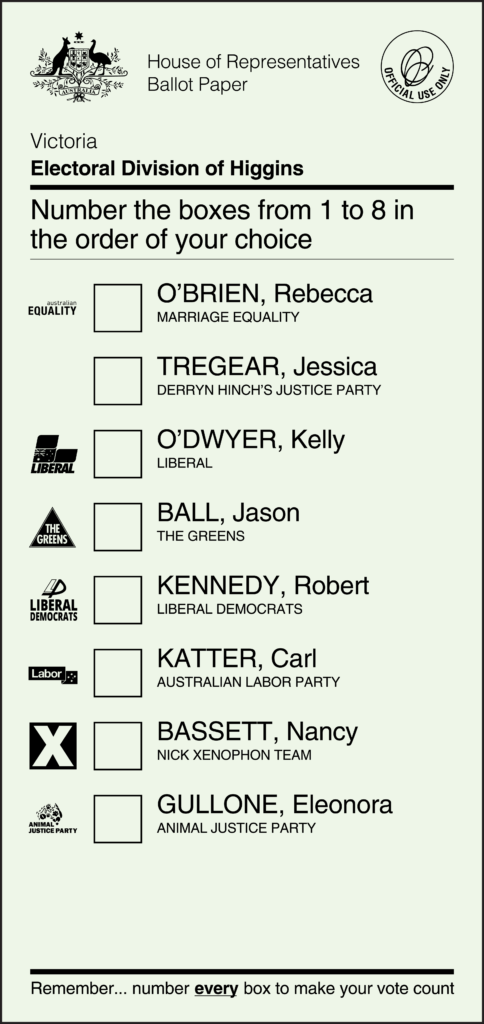
Knapp said instant-runoff voting also leads to more positive election cycles.
“It encourages candidates to focus on problem solving instead of negative attacks and to listen to diverse opinions to find common ground instead of catering to a small vocal base,” he said.
Others agreed.
“Ranked-choice voting has the opportunity to move people to the middle and create a sense of camaraderie in our elections where we want to move toward solutions instead of creating more bitterness,” added Leslie Skardon, director of national issues for the League of Women Voters of South Carolina.
How it works
In the instant runoff voting system, voters rank as many candidates as they want on their ballot in order of preference. All first choices are tallied, and if a candidate receives more than half of the first choice votes, that candidate wins, just like in any other election.
But if there is no majority winner after counting first-choice votes, the race is decided by an instant runoff. The candidate with the fewest first-choice votes is eliminated, and voters who picked that candidate as their top choice have their second choices tallied instead.
This process continues until there is a candidate who wins with a majority of the votes.
“It’s about returning power to the people … and away from special interest groups,” said retired U.S. Army Col. Chris Himsl, who is a director of Veterans for All Voters.
A long time coming
Supporters say recent runoff elections in Charleston did not prompt the action behind this resolution. Rather, Knapp said, they have been pushing for this measure for years.
“Charleston has a reputation for being revolutionary and rebellious,” Himsl said. “Time to pull back those roots and be innovative here again.”
There is opposition to the proposal though. Last month, S.C. Rep. Bill Taylor, R-Aiken, filed H. 4591, a bill banning the use of ranked-choice voting ahead of the next legislative session. It currently resides in the House Judiciary Committee alongside H. 4022.
- Skyler Baldwin is a reporter with the Charleston City Paper. Have a comment? Send to: feedback@statehousereport.com
Slow down!
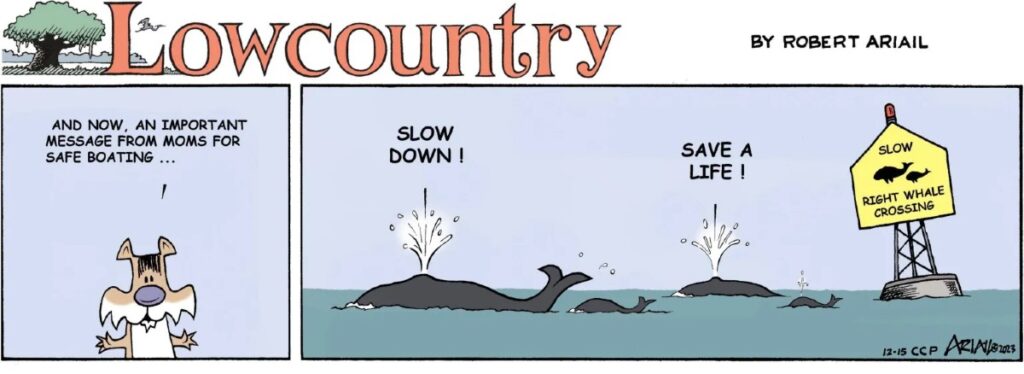
Award-winning cartoonist Robert Ariail generally has a biting or funny comment about the great state of South Carolina in his weekly cartoon. This week, he takes on the plight of right whales, which are dwindling in population in part because of strikes by ships.
- Love the cartoon? Hate it? What do you think: feedback@statehousereport.com.
More good news out there than you might think

By Andy Brack | Many of the themes in this weekly column highlight discouragement – policies and events in South Carolina that aren’t optimal or could work out better for regular people. Examples: The need for better education, health care, roads, wages, gun reform, fair voting, less political division and on and on.
 But for all of the challenges that South Carolina has, there are signs of encouragement during this holiday season. We only have to look to recent headlines to find a little bump of cheer. Some examples:
But for all of the challenges that South Carolina has, there are signs of encouragement during this holiday season. We only have to look to recent headlines to find a little bump of cheer. Some examples:
Clemson’s getting a vet school. For South Carolinians to become veterinarians, they now have to go out of state to get training. More than 200 students are now doing that. But in 2026, Clemson will start enrollment for the state’s first veterinary school, something long needed here. Clemson’s new vet college is fueled by a $285 million investment by the General Assembly.
“The new college will continue to elevate the state of South Carolina by meeting the needs of our communities, retaining top talent, supporting the state’s economy and protecting animal and human health,” Clemson President Jim Clements said in June.
Daily international flight. Charleston airport officials announced this week that the state is getting its first daily international flight from Air Canada between Charleston and Toronto, two of the world’s top cosmopolitan destinations. What an indicator of progress! Just think 50 years back about how hard it was to travel. Now in less than three hours, you can be in Canada.
“Air Canada’s announcement is a major milestone for our industry, the Charleston region and beyond,” said Helen Hill, CEO of Explore Charleston and chair of the Aviation Authority Board. “International visitation is integral to a healthy and sustainable tourism economy.”
Big Sumter investment. As a tip of the hat to South Carolina’s solid manufacturing economy, a German company that makes rare earth permanent magnets is investing $500 million in a Sumter County facility. It will bring 300 jobs to the area and shows how South Carolina is a key player in the growing electric vehicle industry.
GOP House Speaker Murrell Smith, who lives in Sumter, commented: ““The arrival of e-VAC Magnetics in Sumter County is a testament to our state’s booming economic growth and our commitment to fostering an environment that attracts business and opportunity.”
More infrastructure. In fact, infrastructure investment across the state thanks to billions of dollars of federal Covid-era funds are making us more competitive, meaning that South Carolina has used recovery dollars strategically and well to position itself for the future, one seasoned state official said.
One example is how broadband internet connections will be ubiquitous within three years. At present, the state’s billions in spending has brought faster internet to about three-quarters of the state. Up next – connecting the last mile of rural areas across the Palmetto State.
Another example – the state and local governments have spent $1 billion in recent years improving water and sewer infrastructure – something required for more and higher quality economic development.
Low unemployment rate. South Carolina remains blessed to have a low unemployment rate – just 2.9% in the most recent report – meaning there are jobs out there for just about anyone who wants to work. These jobs may not be the highest paying in the nation, but there’s work around, particularly with increased investment by companies from the Upstate to the coast.
“Nearly every economic sector grew or stayed the same month-over-month, with increases in sectors like finance and insurance, as well as professional, scientific and technical services, which includes jobs like computer systems design, engineering and research and development,” S.C. Department of Employment and Workforce Executive Director William Floyd said last month. “Digging deeper into these sectors and understanding the jobs in the different industries is key to being able to appropriately support the workforce.
South Carolina still has a long way to go to catch up in everything from education to health care, but we continue to be on our way. That’s good news for the holiday season.
Andy Brack is editor and publisher of Statehouse Report and the Charleston City Paper. Have a comment? Send to: feedback@statehousereport.com.
Charleston Animal Society
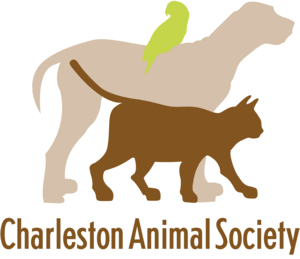 We’re pleased today to shine our spotlight on the Charleston Animal Society, leader in the effort to make Charleston County a safe place for animals. Now the society is working to expand its Charleston success statewide to energize the state to reshape its 300-plus shelters and animal organizations into a no-kill network that stretches from Walhalla to Little River to Daufuskie Island.
We’re pleased today to shine our spotlight on the Charleston Animal Society, leader in the effort to make Charleston County a safe place for animals. Now the society is working to expand its Charleston success statewide to energize the state to reshape its 300-plus shelters and animal organizations into a no-kill network that stretches from Walhalla to Little River to Daufuskie Island.
Safe and healthy communities, neighborhoods and families don’t just happen – they’re built. “No Kill – No Harm – No More” shines a spotlight on animal abuse and family violence, which are often perceived and treated as separate issues. However, animal abuse is often the tip of the iceberg to larger issues in the home, such as child abuse, elder abuse or domestic violence.
- South Carolina’s most honored charity four years in a row
- National model for success
- Southeast’s only AAHA-accredited combined clinic and shelter
- Focused on solving problems rather than reacting to them year after year
- Publishes Carolina Tails, the largest pet magazine in S.C.
- No Kill. No Harm. No More. is a “movement” comprised of two major initiatives: No Kill Charleston and No Kill South Carolina.
- Learn more about the Charleston Animal Society and its work to create a network of humane network for the animals that bring joy to our lives.
Old photo, car
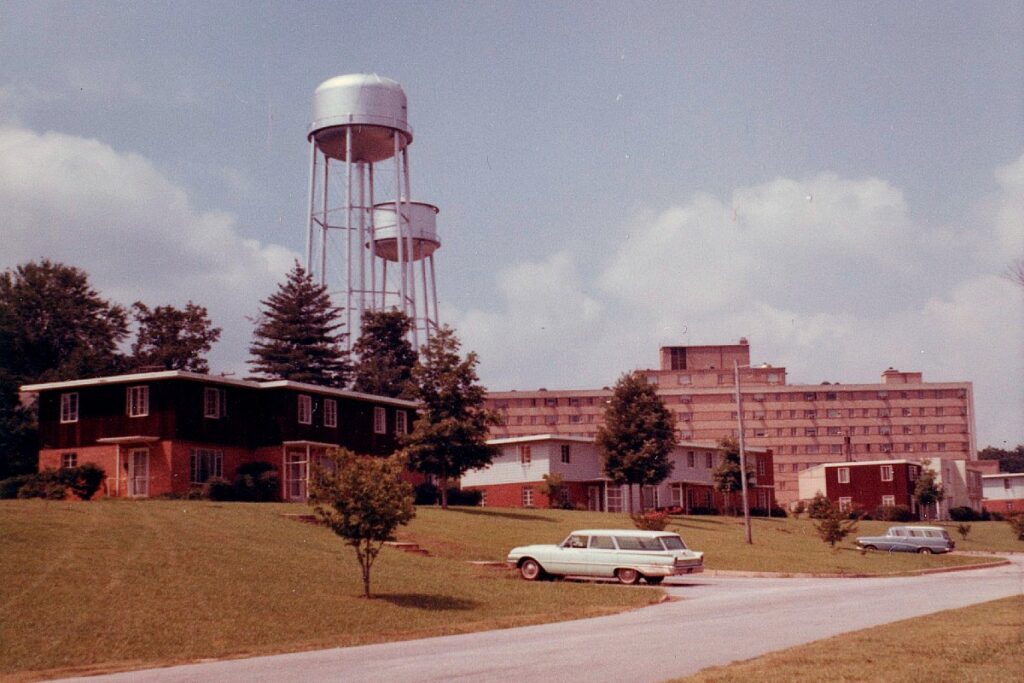
Here’s an old photo of a building and a car. Look familiar? What is it and where is it? Send us your guess of what this photo shows – as well as your name and hometown – to feedback@statehousereport.com.
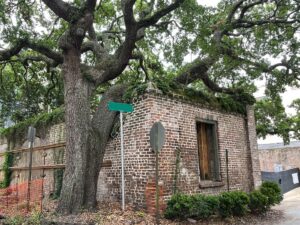 Last week’s mystery photo, “Brick and vines,” shows a brick-and-vine laden area of Bedon’s Alley in downtown Charleston.
Last week’s mystery photo, “Brick and vines,” shows a brick-and-vine laden area of Bedon’s Alley in downtown Charleston.
Allan Peel of San Antonio, Texas, remarked, “This area was first populated in the early 1700s and by the 1730s contained a mix of chandleries, counting houses and mercantile shops. Originally called ‘Middle Lane’, it was renamed after George Beadon (Bedon), a successful merchant and son of an English couple, George and Elisabeth Beadon, who arrived on the first ship to ‘Charles Town’ in 1670.
“The brick wall in the photo originally surrounded a number of small brick outbuildings used by the larger business establishments along Rainbow Row. The area was heavily damaged by the Charleston fires of 1740 and 1778 that swept through the alley and destroyed most of the original structures. What is particularly fascinating about the photo is the fact that as the growth of the live oak tree visible in the photo was being impeded by the wall, the residents decided to reconstruct the wall around the large tree limb rather than cut the tree down to protect the wall. Now that’s what I call preservation consciousness!”
 Congrats to others who spotted this more difficult mystery: Steve Willis of Lancaster; Jay Altman and Elizabeth Jones, both of Columbia; George Graf of Palmyra, Va., who noted the building could have been an old Evening Post printing plant; and Pat Keadle of Wagener, who provided the picture at right;
Congrats to others who spotted this more difficult mystery: Steve Willis of Lancaster; Jay Altman and Elizabeth Jones, both of Columbia; George Graf of Palmyra, Va., who noted the building could have been an old Evening Post printing plant; and Pat Keadle of Wagener, who provided the picture at right;
- Send us a mystery picture. If you have a photo that you believe will stump readers, send it along (but make sure to tell us what it is because it may stump us too!) Send to: feedback@statehousereport.com and mark it as a photo submission. Thanks.
On South Carolina’s (really) bad drivers
To the editor:
![]() On the state’s bad drivers: I imagine, we could probably rise to #1 (yay, us!) if there was such a thing as a traffic stop in the Upstate. The dangerously fast and reckless driving on I-85, I-385 and even tertiary roads is incredible.
On the state’s bad drivers: I imagine, we could probably rise to #1 (yay, us!) if there was such a thing as a traffic stop in the Upstate. The dangerously fast and reckless driving on I-85, I-385 and even tertiary roads is incredible.
I drive down I-85 probably a dozen times a week. I haven’t seen a cop in months (I was going to say 6 to 8 months, maybe longer, but I didn’t think you’d believe me). What I do see is an average road speed of 80 mph, cars routinely weaving in and out of traffic, and cutting in between two cars with maybe a few feet of leeway between them.
Maybe we don’t have as many wrecks but it’s a miracle given the way these crazies drive. And I say that as a native of NEW JERSEY!
– Laura Haight, Greer, S.C.
Send us your thoughts
We encourage you to send in your thoughts about policy and politics impacting South Carolina. We’ve gotten some letters in the last few weeks – some positive, others nasty. We print non-defamatory comments, but unless you provide your contact information – name and hometown, plus a phone number used only by us for verification – we can’t publish your thoughts.
Have a comment? Send your letters or comments to: feedback@statehousereport.com. Make sure to provide your contact details (name, hometown and phone number for verification. Letters are limited to 150 words.
- ORDER NOW: Copies are in Lowcountry-area bookstores now, but if you can’t swing by, you can order a copy online today.
- Now available as an e-book!
ABOUT STATEHOUSE REPORT
Statehouse Report, founded in 2001 as a weekly legislative forecast that informs readers about what is going to happen in South Carolina politics and policy, is provided to you at no charge every Friday.
- Editor and publisher: Andy Brack, 843.670.3996
Donate today
We’re proud to offer Statehouse Report for free. For more than a dozen years, we’ve been the go-to place for insightful independent policy and political news and views in the Palmetto State. And we love it as much as you do.
But now, we can use your help. If you’ve been thinking of contributing to Statehouse Report over the years, now would be a great time to contribute as we deal with the crisis. In advance, thank you.
Buy the book
Now you can get a copy of editor and publisher Andy Brack’s We Can Do Better, South Carolina! ($14.99) as a paperback or as a Kindle book ($7.99). . The book of essays offers incisive commentaries by editor and publisher Andy Brack on the American South, the common good, vexing problems for the Palmetto State and interesting South Carolina leaders.
More
- Mailing address: Send inquiries by mail to: P.O. Box 21942, Charleston, SC 29413
- Subscriptions are free: Click to subscribe.
- We hope you’ll keep receiving the great news and information from Statehouse Report, but if you need to unsubscribe, go to the bottom of the weekly email issue and follow the instructions.
- Read our sister publication: Charleston City Paper (every Friday in print; Every day online)
- © 2023, Statehouse Report, a publication of City Paper Publishing, LLC. All rights reserved.


